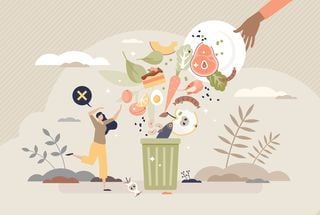When it comes to reducing or eliminating food being wasted and transforming diets, what holds us back?
Waste Not, Want Not: Food as a Major Sustainability Lever?
Sustainability in Hospitality — Viewpoint by Willy Legrand
The big problem
Our global food systems need an overhaul. We are wasting food at every stage of the food cycle and a large proportion of the food we are growing is arguably not good for us or the planet – the waste of resources is magnified if the food we do produce minimal nutritional value in the first place.
Marketers and supporters of the industrialised food system have set the narrative on food, persuading us that we are time-poor, and that we can safely outsource our food and business needs to them. By outsourcing our relationship with food over several generations, we have been losing the connection between what we eat and serve, where the food comes from, and our instinctive ability to recognise what we need for good health1. With this drive for efficiency and yield, the soil that provides the nutrients that should enrich our food and then our bodies, is depleted, and food has become the rightful target of climate activists.
Scientific ‘advances’, misguided government subsidies2, and the industrialisation and globalisation of the food systems have led to cheaper, abundantly available, but arguably less nutritious food. Food preparation has been largely outsourced to factories and producers have learned how to process and ultra-process foods, to preserve and add the flavourings to deliciously mask nutritional deficiencies3.
Education and research
We need grass roots campaigners, independent and decisive governance, and leaders and managers who are willing to improve education around food. Food education should be reintroduced universally into the curriculums at schools to reflect its importance in human and planetary health. Resources are needed to develop systems that work in tandem with nature rather than accepting and encouraging the messaging of the big agriculture and food companies that profit from the status quo.
Regenerative Organic, and Local
A regenerative organic food movement which, if adequately supported, could produce enough to feed the world a more balanced diet of better quality, nutrient rich, delicious and affordable food. This will require effort and decision on behalf of governments, corporations and each of us, to insist on a food system where the health of the planet and the diverse creatures (including humans) that live on it is prioritised ahead of profit alone.
Hospitality companies can make a difference, by committing to buying local, organic and regenerative seasonal produce, helping to educate their teams to cook healthy food from scratch and putting all the ingredients that they buy to good use. Chef Dan Barber discusses eating the whole farm in his inspirational book ‘The Third Plate’, and also the important role that chefs can play in creating a market for the ‘bycatch’; the ingredients that are grown alongside the main crops in a regenerative system.
Hospitality businesses can help to change the narrative about food, encourage more food education programs, engage with suppliers who source locally from producers who grow organically and regeneratively, giving them a consistent market for their products and financial incentives for producing food that is delicious and healthy.
What about the cost?
Leaders and managers will legitimately argue that they have a responsibility to their shareholders to increase profits; and to their guests to provide consistent choices of food which they will enjoy. Seasonal freshly prepared ‘healthy’ foods might not seem like a viable financial option for global hotel brands that must deliver consistent popular items that will sell at a reasonable margin with minimal labour costs.
Reducing food waste and developing menus with healthy, locally sourced food served in sensible portion sizes is a good goal for hospitality businesses leaders and managers looking to improve their sustainability credentials, but will it be profitable? In an ideal world, this type of activity would allow for healthy profits as well as happy and healthy guests. It would have the added benefit of strengthening relationships with local suppliers. In practice leaders will need to demonstrate that this can work on a larger scale, and governments must legislate against practices that put profit ahead of health and environmental sustainability.
Reducing food waste and spillage to improve margins, cash flow and the bottom line was a financial lever before it became a climate change lever. The amount of time a leader and manager will spend on the issue will be a reflection on the potential impact to their bottom line. As reputational and financial cost of waste increases and the corelations between an unhealthy food system, and planetary and human health becomes more obvious, leaders will find the time to incentives managers differently and consumers will demand healthier options.
Our suppliers will keep producing meat in feedlots, fed on crops that are grown in monoculture environments and modified and sprayed to increase yield and kill pests, as long as they have a profitable and legal market for what they produce. If they can use flavourings and marketing messages that fool us into thinking we are getting the nutrients we need from cheap ultra-processed food, they will as it is allowed and profitable. We must reduce the market for these products and give our business to an alternative that is better for planet, people, and, when done right, profit.
Conclusions
There is no simple one size fits all ‘solution to this mammoth topic. Hotels cater to all types of demand and their food service offerings vary enormously depending on the type of property, the location, and the guests they cater to. By understanding the impact of our food choices, and by improving the training and education of our teams and our guests, we can help to make food part of the solution to climate and health crises, rather than a core contributor to the problem. This can be done while maintaining a healthy triple bottom line, but we will need the support of our business and government leaders, and a rebuilding of the human relationship with food that should come partially from a stronger emphasis on food education from a young age4. Efforts to reduce waste on a localised level should be introduced alongside a more rigorous focus on the products we select so as to provide a market for the local producers with strong environmental and ethical credentials.
Afterword
About 12 years ago, my wife Bumjoo, who I met studying for a Master’s Degree at Cornell University’s hotel school, started to insist that we eat organic food where possible at home. She was concerned about the effect of the chemicals involved in producing our food. Her diagnosis with an auto immune disease and her driving desire to understand what we can do as individuals to improve our food systems is resulting in a documentary film, ‘Delicious Revolution’ (currently in production). The meticulous and lengthy research for this film over many years, highlighted to us the dangers of the ‘conventional’ western industrial food systems which are regularly linked to increased rates of obesity, heart disease and chronic illnesses not to mention, soil degradation, food waste and climate change.
1. Read Nourishment – by Fred Provenza and The Dorito Effect by Mark Schatzker for some eye opening research and discussions on these topics.
2. Read The Omnivore’s Dilemma by Michael Pollen for an interesting discussion on the growth of the corn industry and industrialised beef production.
3. Read The Dorito Effect by Mark Schatzker for a history of the flavour industry.
4. For a delightful vision of a healthy and abundant farming future watch the Biggest Little Farm – directed by John Chester – it isn’t easy, but it could just be possible….

 by
by 

